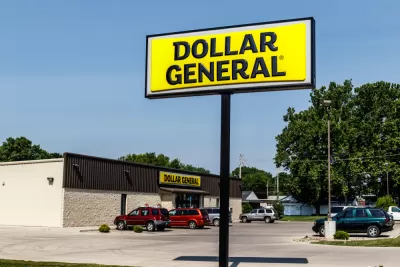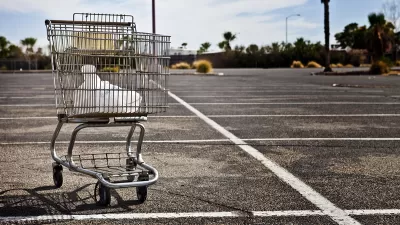Stores like Dollar General and Dollar Tree are putting a lot of grocery stores out of business, leaving communities with fewer places to buy fresh produce.

A growing portion of the United States lacks a grocery store, in part because their grocery stores can’t compete with Dollar stores. "These low-priced 'small-box' retailers, like Dollar General, offer little to no fresh food—yet they feed more Americans than either Trader Joe's or Whole Foods, and are gaining on the country’s largest food retailers,” Claire Kelloway reports for Civil Eats.
The Institute for Local Self-Reliance (ILSR) has published a study showing the way the story of dollar stores is tied to the long-running trend of consolidation in grocery stores. "The report makes the case that dollar stores undercut small rural grocers and hurt struggling urban neighborhoods by staving off full-service markets," Kelloway reports. Large chains like Kroger and Ahold-Delhaize buy up smaller chains and eliminate less profitable locations, leaving fewer local grocers. Those that remain struggling to compete. "These dominant chain stores have decimated independent retailers and divested from rural and low-income areas, as well as communities of color," Kelloway writes.
"Some, including dollar-store executives themselves, argue that a low-cost retailer seeking to go where no one else will benefits underserved communities," Kelloway reports. The ISLR counters that these stores have done a great deal to make the areas around them less desirable, by putting local grocery stores out of business.
FULL STORY: Dollar Stores Are Taking Over the Grocery Business, and It’s Bad News for Public Health and Local Economies

Maui's Vacation Rental Debate Turns Ugly
Verbal attacks, misinformation campaigns and fistfights plague a high-stakes debate to convert thousands of vacation rentals into long-term housing.

Planetizen Federal Action Tracker
A weekly monitor of how Trump’s orders and actions are impacting planners and planning in America.

In Urban Planning, AI Prompting Could be the New Design Thinking
Creativity has long been key to great urban design. What if we see AI as our new creative partner?

King County Supportive Housing Program Offers Hope for Unhoused Residents
The county is taking a ‘Housing First’ approach that prioritizes getting people into housing, then offering wraparound supportive services.

Researchers Use AI to Get Clearer Picture of US Housing
Analysts are using artificial intelligence to supercharge their research by allowing them to comb through data faster. Though these AI tools can be error prone, they save time and housing researchers are optimistic about the future.

Making Shared Micromobility More Inclusive
Cities and shared mobility system operators can do more to include people with disabilities in planning and operations, per a new report.
Urban Design for Planners 1: Software Tools
This six-course series explores essential urban design concepts using open source software and equips planners with the tools they need to participate fully in the urban design process.
Planning for Universal Design
Learn the tools for implementing Universal Design in planning regulations.
planning NEXT
Appalachian Highlands Housing Partners
Gallatin County Department of Planning & Community Development
Mpact (founded as Rail~Volution)
City of Camden Redevelopment Agency
City of Astoria
City of Portland
City of Laramie





























